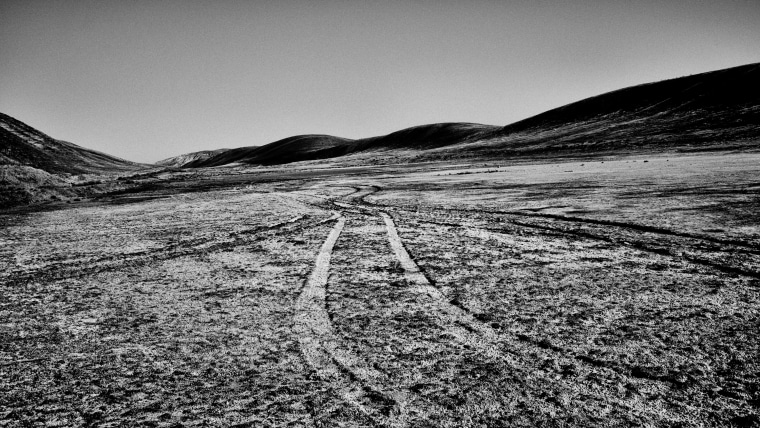MSNBC reporters traveled far and wide over the past year, hitting the campaign trail and shining a light on poverty-stricken pockets of the country. Here are 10 must-read stories we published in 2015.
Geography of Poverty: A journey through forgotten Americaby Trymaine Lee
The most vulnerable Americans are being crushed by the grip of poverty, from the deserts of the Southwest through the black belt in the South, to the post-industrial, rusting factory towns that dot the Midwest and Northeast.
Shuttered: The end of abortion access in red Americaby Irin Carmon
Roe v. Wade — the 1973 Supreme Court opinion legalizing abortion — started in Texas. Now, as abortion rights are under unprecedented attack, it’s Texas that could trigger the end of Roe v. Wade. At stake: The reproductive rights of millions of American women, across the entire country.
Our old familiar globe is goneby Tony Dokoupil
It’s melted and dried, burned and drowned, storm-wracked in ways never experienced before. The past three decades have been the hottest on record and 2015 is expected to set a scorching new high. As a species, we are already moving and adapting, adjusting our definition of hospitable land.
In 2016 race, drug courts get second lookby Aliyah Frumin
Judge Jo Ann Ferdinand looked past the lawyers and spoke directly to the criminal offenders before her. “You should feel proud of yourself,” she said to one. “I know this hasn’t been easy for you,” she consoled another. The judge asked personal questions, like where one offender learned his cooking skills. Several times, the courtroom broke into applause when Ferdinand presented someone with a certificate, bracelet, and handshake. It wasn’t your typical day in court.
The failed experiment of immigrant family detentionby Amanda Sakuma
The steady hum of construction was a near-constant backdrop here for months, as the federal government rushed to build higher cement walls to confine immigrant mothers and their children. Now those sounds are being silenced as the cracks appear in an immigrant detention policy that may soon soon give way.
Forget 2016: Democrats already have a plan for 2020by Benjy Sarlin
As President Obama’s second term winds down and Hillary Clinton’s likely presidential campaign winds up, it feels like the 2016 election is drawing even more attention than the upcoming midterm races. But there’s another election increasingly on the minds of Democratic lawmakers, party operatives, big money donors, and progressive activists: 2020. That’s the year voters will elect state lawmakers who will redraw congressional and state legislative districts all over the country.
How shy stay-at-home mom is shaking up a major voting banby Zachary Roth
In 2013, Kelli Griffin went to vote in a local election in Montrose, Iowa. But what happened next would make clear that in the eyes of the law, Griffin wasn’t at all like everybody else. It would set this shy stay-at-home mom who never graduated college on a path to challenging her state’s highest officials. And it would help spark the latest step in a growing push-back against a set of laws that, five decades after the passage of the Voting Rights Act, still disenfranchise millions of Americans.
N-word analysis: Why Obama needs to keeping talking about raceby Adam Howard
Barack Obama is not the first sitting president to utter the N-word. Lyndon Johnson loved to throw it around, and Richard Nixon used it repeatedly on tape with malicious intent. But Obama is the first African-American president. His use of the term is fraught with a kind of complexity and nuance that sets him apart from his predecessors.
From idol to ‘sellout’: How Ben Carson is losing his legacyby Jane C. Timm
Growing up in the predominantly black neighborhood of Forest Park in Baltimore, Erica Puentes considered Ben Carson her ultimate role model. “We were fed a healthy diet of Ben Carson. Ben Carson is the figure you have to look up to, model yourself to be,” Puentes, a 20-year-old University of Maryland College Park student, recalls now. “We were working class students of color and he just represented hope.” But now, as Republican presidential candidate and the only African-American in the crowded GOP field, Carson may be losing that legacy and disillusioning legions of fans who grew up idolizing him.
Skeptical of shelters, NYC’s homeless brave the blizzardby Emma Margolin
Frank waited with the others for dinner from a van – meatball soup, oranges, milk, some stale bread. He wore no hat, no jacket and plastic bags for shoes. It was 27 degrees out in New York City. Irritated about the bread, Frank shuffled east on 40th street toward 9th Ave., away from the second stop on the Coalition for the Homeless’ uptown feeding route. Paul Fitzgerald, 26, who was driving the van full of food that night, said he’d known Frank since he started as a volunteer with Coalition for the Homeless four years ago. In that time, Fitzgerald, now a program assistant with the organization, has never been able to convince Frank to wear shoes. But he was happy about one thing – Frank did take a pair of donated socks with his meal.
